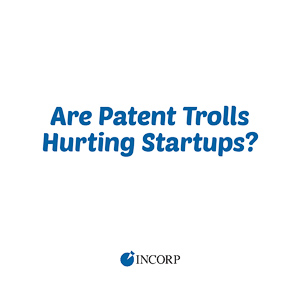Stay in the know!
Join our newsletter for special offers.
"Patent troll" companies may be targeting your business right now. It's no fairy tale, and if you're a victim, you may not live "happily ever after." However, you'll have a better chance of avoiding their traps if you know how they operate and what your options are.
Patent trolls are generating a lot of buzz lately, especially in the tech community, but also in politics and the courts. More politely called "non-practicing entities" (NPEs), patent trolls don't sell any products or services of their own. Instead, they make their money by purchasing patents on the open market, often from businesses that are going under. They have no intention of using the patents themselves. Instead, they typically send out officially-looking letters warning companies that they are using software or high-tech hardware that infringes on one of their patents. They threaten to sue unless the user pays hefty licensing fees. Because it may cost millions of dollars to defend a patent lawsuit in court, trolls often get the fees they demand.
Although it would have been possible for companies to use these techniques years ago for standard patents (for example, in manufacturing or the pharmaceutical industry), patent trolls didn't really become a problem until the U.S. Patent and Trademark Office (USPTO) started issuing software patents in the 1990s. The USPTO now approves more than 50,000 software patents every year, and many of them include language that is so vague that unscrupulous patent owners can claim that their patent covers a wide range of technology instead of a single program or process.
Although tech companies are at the highest risk of attack, even end users can face litigation, because current laws allow patent owners to sue anyone who uses the technology covered by a patent. For example, a coffee shop owner could be sued for providing Wi-Fi for his customers using a legally purchased router that supposedly infringes on someone's patent. One troll company sent out thousands of letters claiming it had a patent on the technology that enables people to e-mail scanned documents. It demanded that companies pay $1,000 per employee for a license to keep using the process. While some cases, like that one, obviously wouldn't stand up in court, if the troll is persistent enough, it could cause expensive legal problems for its victims.
More than half of all patent lawsuits are now brought by trolls. In 2013, wireless carrier AT&T was sued by trolls for patent infringement 54 times. Google was hit with 43 lawsuits, Verizon, 42; Apple, 41; Samsung and Amazon, 39 each; Dell and Sony, 34 each; and BlackBerry, 31 times.1 One study by Boston University estimated that U.S. businesses incurred $29 billion in costs in 2011 because of patent trolls. 2 These costs can include not only the licensing fees (if the trolls' targets choose to pay them) but also attorneys' fees, as well as loss of productivity as company management is forced to redirect resources from running their business to dealing with the legal issues caused by trolls.
The growing problem of patent trolls has attracted attention in Congress, and President Obama even referred to it in his 2014 State of the Union Address, calling on Congress to pass patent legislation.3 The U.S. Justice Department, the Federal Trade Commission, the USPTO, and a White House task force have all launched studies to look for solutions. Several bills are pending in Congress, including one that would make it easier for judges to require patent trolls to pay for court costs. The Obama administration has also asked the USPTO to take the important step of tightening its scrutiny of patent claims that appear overly broad. Vermont and Oregon are the first two states to pass laws prohibiting bad-faith assertions of patent infringement as unlawful trade practices.
The following advice comes from the non-profit Electronic Frontier Foundation (EFF), which takes on legal cases that set important precedents regarding rights in cyberspace: 4
Related Articles and Services:
Join our newsletter for special offers.
